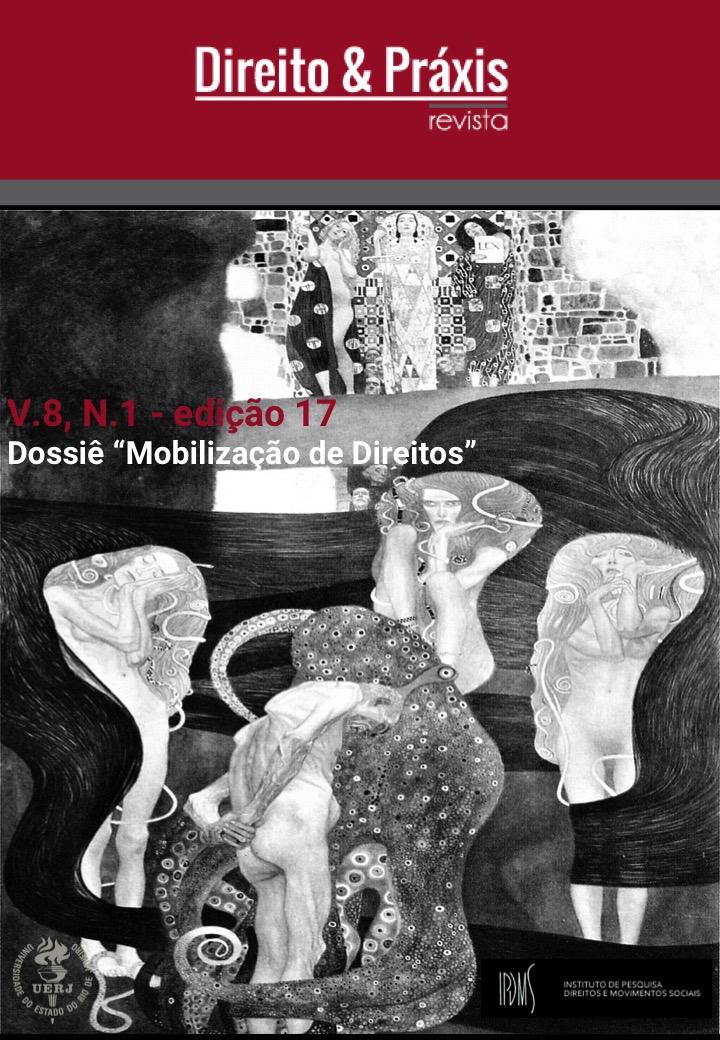Judicial Crisis in Portugal: The Constitution in relation to the State, Social and Labor Movements / Crise judiciária em Portugal: a Constituição em relação ao Estado e aos movimentos sociais e trabalhistas
DOI:
https://doi.org/10.12957/dep.2017.27764Palavras-chave:
Portugal, judicial crisis, social and labor movements / Portugal, crise judiciária, movimentos sociais e trabalhistas.Resumo
DOI: 10.12957/dep.2017.27764
Abstract
In Portugal, the Constitutional Court provoked a flurry of debates concerning its role during the peak of the anti-austerity-movements in Portugal, between 2010 and 2014. The accusations culminated in the term ‘juridical activism‘, meaning the 13 judges took an active political role in dealing with highly contested subjects such as cuts in the wages, and the pensions of the Portuguese public sector. In these debates the socio-economic background and the role of other actors such as social movements is often neglected. Portugal has a rich history of social movements, protests and strikes. During the revolution in 1974/75, the working classes could inscribe parts of their interests into the Portuguese Constitution. The Portuguese legal system therefore, was one of the most progressive worldwide. However, casualisation, privatization and the dismantling of the welfare state have undermined the achievements of the social movements during the revolution in the 1970s. Since 2011 Portugal entered severe economic turmoil, new movements against austerity measures emerged and challenge the bailout-program and the constitutional frame. The inter-linkage between a serious economic crisis, the attempted solutions, and the rising social movements contesting these events, culminated in a judicial crisis – a point of conjuncture for different antagonistic actors and their (class) interests – creating several deadlocks and opportunities for political and social change in divergent directions.
Keywords: Portugal; judicial crisis; social and labor movements.
Resumo
Em Portugal, o Tribunal Constitucional provocou uma onda de debates sobre o seu papel no auge dos movimentos anti-austeridade no país entre 2010 e 2014. As acusações culminaram no termo "ativismo jurídico", o que significa que os 13 juízes desempenharam um papel político ativo no tratamento de assuntos altamente controversos, como cortes nos salários e pensões do setor público português. Nesses debates, o contexto socioeconômico e o papel de outros atores, como os movimentos sociais, são muitas vezes negligenciados. Portugal tem uma rica história de movimentos sociais, protestos e greves. Durante a revolução de 1974/75, as classes trabalhadoras puderam inserir parte de seus interesses na Constituição Portuguesa. O sistema jurídico português é considerado, portanto, um dos mais progressistas do mundo. Contudo, a precarização, a privatização e o desmantelamento do Estado de bem-estar enfraqueceram as conquistas dos movimentos sociais durante a revolução dos anos 1970. Desde 2011, Portugal entrou em grave turbulência econômica; novos movimentos contra medidas de austeridade surgiram, os quais desafiam o programa de ajustamento e a estrutura constitucional. A interligação entre uma grave crise econômica, as tentativas de solução e os movimentos sociais em ascensão, que contestaram esses desenvolvimentos, culminaram com uma crise judicial – um ponto de conjuntura para diferentes atores antagônicos e seus interesses (de classe) – criando vários bloqueios e oportunidades para mudanças políticas sociais em direções divergentes.
Palavras-chave: Portugal; crise judiciária; movimentos sociais e trabalhistas.Downloads
Downloads
Publicado
Como Citar
Edição
Seção
Licença
Os textos são de exclusiva responsabilidade de seus autores.
É permitida a reprodução total ou parcial dos artigos da Revista Direito e Práxis, desde que citada a fonte.
Este trabalho está licenciado sob uma Licença Creative Commons 4.0, Atribuição-Sem Derivações.
Esta licença permite copiar e redistribuir o material em qualquer suporte ou format para qualquer fim, mesmo que comercial, desde de que citada a autoria original.
This work is licensed under a Creative Commons Attribution 4.0 International License.




